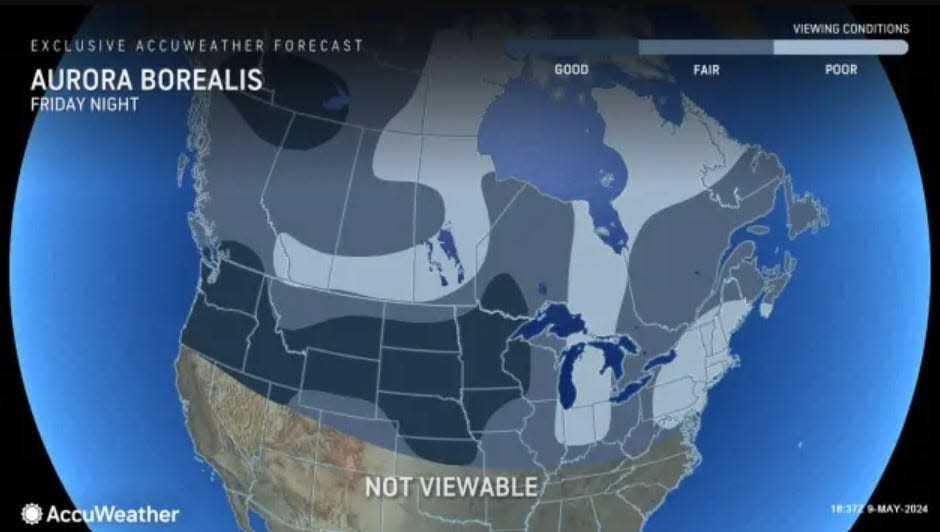It's a good weekend for aurora borealis: Will northern lights be visible in NC, Asheville?
Aurora borealis, often referred to as the northern lights, has been appearing more often and in a wider range of visibility as of late. In fact, during April 2023, vibrant auroras were seen as far south as Arkansas and Arizona.
Many are now wondering about the next celestial event: Is this pattern expected to continue? What's causing the uptick? If you were hoping to see the display you'll have another opportunity very soon, but you may have to leave North Carolina to get a look.
Auroras like those forecast this weekend, May 10-12, are courtesy of coronal mass ejections from the sun, which are forecast to reach the Earth this weekend, producing geomagnetic storms that trigger the celestial displays.
Forecasters have also warned that, while G4s and other strong solar storms produce the beautiful lights associated with auroras, they also may disrupt radio communications, harm satellites and potentially even knock out power systems.
More: Music listening lounge with cocktails, ice cream planned for West Asheville
Will the northern lights be visible in North Carolina?
Unfortunately for N.C. astronomy enthusiasts, the aurora won't quite reach the state. AccuWeather said that the April auroras in 2023 were some of the best since 2003, and were reportedly visible as far south as Arizona, Oklahoma, Arkansas and North Carolina.
This weekend, AccuWeather is predicting that the farthest regions the auroras will be visible to the naked eye will be Virginia, Missouri, Colorado and Northern California.
The website also added, however, that stargazers farther south may still be able to capture images of the auroras with the use of long-exposure photography.
Where will the northern lights be visible?
Here's the full list of states where AccuWeather predicts the aurora will be visible (if weather conditions allow for viewing):
Washington
Oregon
Idaho
Montana
Wyoming
North Dakota
South Dakota
Nebraska
Minnesota
Wisconson
Iowa
Michigan
Indiana
Illinois
Ohio
Pennsylvania
New York
Maryland
Connecticut
Rhode Island
New Hampshire
Vermont
Maine
New Jersey
Delaware
Alaska
The aurora will be also be visible in parts of:
California
Nevada
Utah
Colorado
Kansas
Missouri
Kentucky
West Virginia
Virginia

What time will northern lights be visible? When will aurora be visible?
A G4 (severe) geomagnetic storm watch is in effect for Saturday, May 11, according to NOAA in previous reporting form USA Today. The storm is likely to create aurora displays Friday, Saturday and Sunday nights.
While aurora borealis may be visible in the morning and evening, experts from the NOAA say that it won't be as active or visually appealing.
Best hours for aurora viewing are generally between 10 p.m. and 2 a.m. local time, with hours expanding toward evening and morning as levels of geomagnetic activity increase. And, of course, for the best experience, you'll want to find an area with the least amount of light interference possible.
"Go out at night," NOAA said. "And get away from city lights."
More: Naked gardening? Asheville ranks in top 5 among 500 US cities: What to know.
What causes aurora borealis?
The aurora is occurring more regularly and in wider areas due to increased amounts of coronal mass ejections associated with the "solar maximum," which will happen in 2025. This weekend in particular, the forecast G4 geomagnetic storm is responsible.
"This weekend's geomagnetic storm watch has been upgraded from G2 (Moderate) to G4 (Severe)," according to astronomer Tony Phillips on SpaceWeather.com. "Why? Because giant sunspot AR3664 keeps hurling CMEs toward Earth. Following today's X2.2 solar flare, there are now at least 4 storm clouds heading our way," Phillips said.
Auroras may look magical, but the explanation for the phenomenon is hard science. The displays form when particles flowing from the sun are caught in Earth's magnetic field. When these particles interact with molecules of atmospheric gases, the famous eerie green and rusty red become visible.
More: A critically endangered newborn addax now calls Disney's Animal Kingdom home: Watch video
Doyle Rice, USA Today, contributed to this report.
Iris Seaton is the trending news reporter for the Asheville Citizen Times, part of the USA TODAY Network. Reach her at [email protected].
This article originally appeared on Asheville Citizen Times: Northern lights 2024: aurora borealis visibility May 11 Asheville, NC
